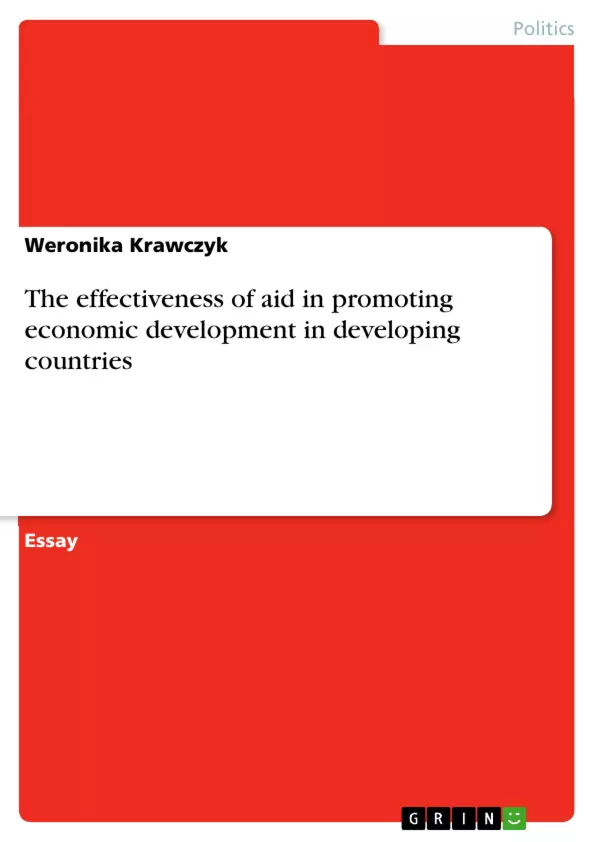Ever year billions of dollars are channeled to developing countries to help them escape the poverty traps they are stuck in. According to the OECD statistics development aid given to the countries in need accounted for USD 142,6 billion in 2016. And, yet foreign aid remains a very controversial issue and its effectiveness has been highly debatable. The aim of this essay is to explore the reasons behind problematic aspects of development aid as well as to try to find a solution to them.
Inhaltsverzeichnis (Table of Contents)
- Poverty and Economic Development: A Complex Interplay
- Aid and Its Effectiveness: A Critical Assessment
- Institutions and Growth: The Foundation for Sustainable Development
- Aid Misuse and Corruption: A Major Challenge
- Geopolitical Interests and Aid Allocation: A Strategic Tool
- Bilateral vs. Multilateral Aid: A Comparative Analysis
- Multilateral Aid: A More Development-Oriented Approach?
Zielsetzung und Themenschwerpunkte (Objectives and Key Themes)
This paper aims to critically assess the effectiveness of aid in promoting economic development in developing countries. It examines the role of aid in poverty reduction, economic growth, and institutional development, while considering the challenges posed by corruption, geopolitics, and aid allocation mechanisms.
- The complex relationship between poverty, economic development, and aid
- The effectiveness of aid in generating sustainable economic growth
- The influence of institutional factors on development outcomes
- The misuse of aid and its impact on development
- The role of geopolitics in aid allocation and its implications for effectiveness
Zusammenfassung der Kapitel (Chapter Summaries)
- Poverty and Economic Development: A Complex Interplay: This chapter introduces the multifaceted nature of poverty and its impact on economic development. It discusses the challenges faced by developing countries in overcoming poverty and achieving sustainable growth, highlighting the role of institutions and inclusive governance.
- Aid and Its Effectiveness: A Critical Assessment: This chapter examines the role of aid in promoting economic development and its limitations. It explores the debate on the effectiveness of aid in achieving poverty reduction and fostering long-term growth, while acknowledging the potential pitfalls of aid dependence.
- Institutions and Growth: The Foundation for Sustainable Development: This chapter emphasizes the crucial role of institutions in driving economic growth and development. It analyzes how well-functioning institutions, including property rights, rule of law, and transparent governance, are essential for attracting investment, fostering productivity, and promoting sustainable development.
- Aid Misuse and Corruption: A Major Challenge: This chapter delves into the problem of aid misuse and corruption in developing countries. It discusses how corruption can undermine the effectiveness of aid and hinder development efforts. It highlights the need for accountability, transparency, and strong governance to prevent aid diversion and promote its effective utilization.
- Geopolitical Interests and Aid Allocation: A Strategic Tool: This chapter examines the influence of geopolitics on aid allocation. It argues that aid is often used as a tool for achieving donor countries' foreign policy objectives, leading to biases in aid distribution and potentially hindering its development impact. It explores how aid is channeled to countries with strategic importance rather than those with the greatest need.
- Bilateral vs. Multilateral Aid: A Comparative Analysis: This chapter compares and contrasts bilateral and multilateral aid, exploring their respective strengths and weaknesses. It examines the argument that bilateral aid is more politically driven, while multilateral aid is perceived as less politically biased and more development-oriented. It analyzes the different motivations, allocation strategies, and effectiveness of each approach.
- Multilateral Aid: A More Development-Oriented Approach?: This chapter delves into the effectiveness of multilateral aid in promoting development outcomes. It explores the potential for multilateral agencies to exert pro-poor conditionality and promote development objectives more effectively than bilateral agencies. It also acknowledges potential biases and challenges in multilateral aid allocation, highlighting the need for accountability and transparency.
Schlüsselwörter (Keywords)
This paper focuses on the relationship between aid, economic development, and poverty reduction. It examines key themes such as institutional quality, governance, corruption, aid allocation mechanisms, geopolitical interests, bilateral and multilateral aid, and the effectiveness of aid in achieving sustainable development outcomes.
- Quote paper
- Weronika Krawczyk (Author), 2018, The effectiveness of aid in promoting economic development in developing countries, Munich, GRIN Verlag, https://www.grin.com/document/421545



